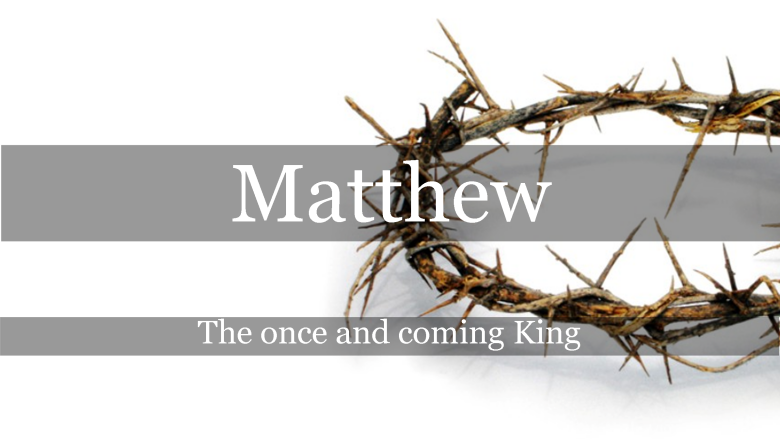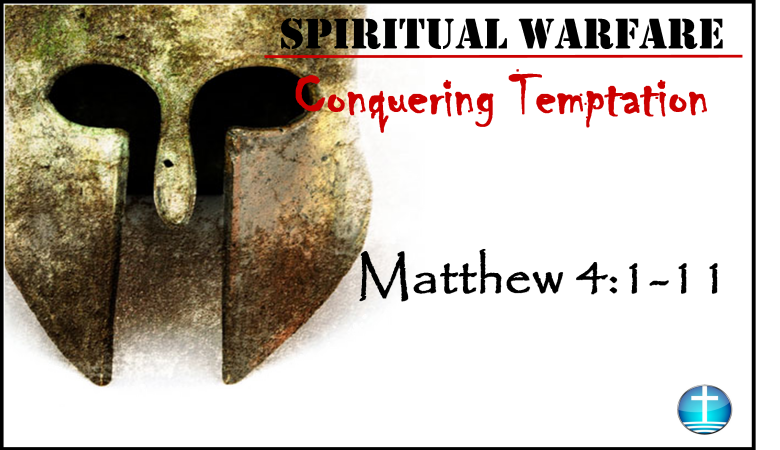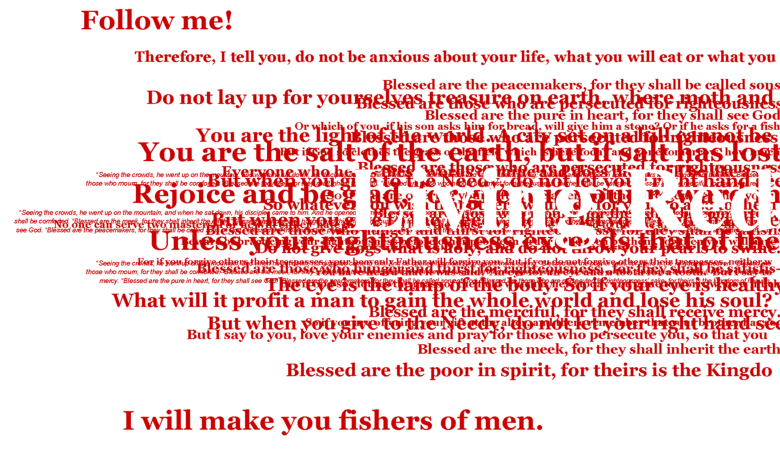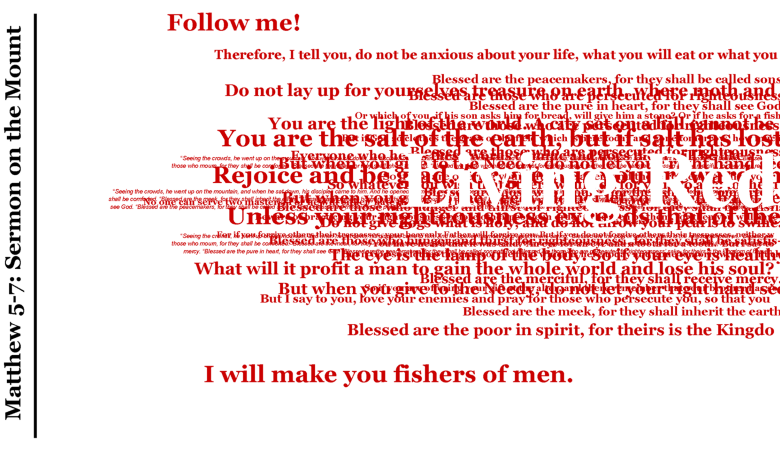Matthew 23:13-15, "The Hellish Nature And True Danger of False Teachers"
How well do you really know Jesus? How do you really think of Jesus? Do we see Him as a warm, loving Saviour to whom we may come with our every desire? Is He “Gentle Jesus, meek and mild”?
If so, what are we to make of the Jesus of Matthew chapter 23, the Jesus who strips away the deceptive covering of the Jewish leaders who claimed absolute control over the people of God? The Jesus who pronounces 7 woes upon these Jewish leaders: who repeatedly calls them “Scribes, Pharisees, hypocrites: 23: 13, 14, 15, 23, 27, 29, who also calls them blind guides;23:16; fools and blind; 23: 17; & 19; serpents, and a brood of vipers 23:33.;
That is hardly the language that we might expect from the merciful Saviour of our souls.
Do you wonder what would bring such venom from the lips of the Son of God? Can we imagine Him standing in our midst saying such things about people or agencies or churches or denominations we know?
If that picture doesn’t quite fit how we think about Jesus, then do we really understand the Jesus who spoke to the apostle John in Revelation chapter 1 “whose eyes were like a flame of fire.”.
But why would He be so incensed against these Jewish leaders?
Many years ago, I went through the Gospel of John and marked all the places with a dagger where these Jewish leaders expressed hatred and even murder against Jesus.
John 5:16 “or this reason the Jews persecuted Jesus, and sought to kill Him, because He had done these things on the Sabbath.”
John 5:18 “herefore the Jews sought all the more to kill Him, because He not only broke the Sabbath, but also said that God was His Father, making Himself equal with God.”
At least 18 times there is a dagger inserted in John’s gospel before we come to His final betrayal, arrest, trial and crucifion.
The animosity of the Jewsih leaders against Jesus is no new thing to the gospels when we come to Matthew chapter 23.
In Matthew’s Gospel chapter 22, the Scribes and Pharisees and Sadducees tried by every means to trip him up without success. Now in chapter 23:He denounces them for their burdening their people without thought of helping them; 23:4; for their love of the limelight, love of the places of prominence and the expressions of respect from the people of Israel. What really disturbed them was the idea that this upstart, this untaught Jew, was drawing the attention of, the love and respect of the crowds who ought to have been impressed only with their leaders. Jealousy produced bitterness, and hatred and murder in their hearts.
No wonder Jesus called them hypocrites..
These woes then represented no outburst of uncontrolled ange. These denunciations were expressions of sorrow neither vindictive, nor spiteful as much as judicial - expressions of Christ’s righteousness directed against all that is unrighteous. They were an”unsparing and sustained indictment” the rolling thunder of Christ’s wrath” A.T. Robertson - like thunder in unanswerable severity, and like lightening in unsparing exposure - they illuminate while they strike” righteous anger, but it is the anger of the heart of love, broken by the stubborn blindness of men- an atmosphere of poignent tragedy.” Barklay Gospel of Matthew Vol. 2 p. 318
He knew they had so many followers amongst the people - and he had to expose them for what they were, in order that their hold on the common people might be broken.
But who were the Pharisees -The Jews had a saying - Moses received the law from God, and delivered it to Joshua; Joshua to the elders; the elders to the prophets; the prophets to the men of the Great synagogue.” All Jewish law is based on the 10 commandments and the first 5 books of the Bible.. To them the law was the very word of God, the most precious possession in the world.
Under Ezra and Nehemiah, the people were allowed to come back to Jerusalem. Ezra the scribe took the book of the law and read it to them followed by a national dedication of the people to the keeping of the Law. The men whose business it was to study the Law were the scribes.
But right here there came the heart of the problem for these great principles of the Law were broken up into thousands and thousands of little rules and regulations to build a fence around the Law - more than 50 volumes
About 175 B.C. Antiochus Epiphanes made a deliberate attempt to stamp out the Jewish religion and to introduce Greek religion and customs and practices. At thei point the Pharisees arose as a separate sect -their name means “The Separated Ones” - men who dedicated their whole lives to one long observance of Judaism in its most elaborate and ceremonial and legal form. - careful and meticulous observance of every rule and regulation which the scribes had worked out. If a man was to accept and carry out every little regulation of the law, he would have time for nothing else; he had to withdraw from ordinary life in order to keep the law.
They were dedicated legalists; men in desperate earnestness about their religion. who made religion for their followers a burden rather than a blessing. They were the righteous ones -. Therefore they needed to be seen to be righteous; therefore the large phylacteries; long fringes; to draw attention to himself;
When my wife and I went to the Passion play at Drumheller, Alberta, it is no wonder that the best actors in the play were these religious leaders for they were so easy to copy.
They loved the best seats - closest to the host - on couches, leaning on host’s breast
There is an interesting evidence of the influence of this thinking even on the disciples mirrored in the request of James and John that when Christ came into his kingdom they would be allowed to have seats on his right and left side.
So this brings us to the pronunciation of the first of the woes by the Lord Jesus.
- Their refusal to enter the kingdom
Matthew 23:13 "But woe to you, scribes and Pharisees, hypocrites! For you shut up the kingdom of heaven against men; for you neither go in yourselves, nor do you allow those who are entering to go in.”
To what does the kingdom of heaven refer? the kingdom of heaven - the reign of God in Christ that begins on earth in human hearts and lives and is perfected in the hereafter. The best way to think of the kingdom is as a society in which God’s will is done on earth as it is in heaven..
When Jesus came preaching the kingdom of heaven he was stating that the messianic reign was begun and it centred in Jesus the promised Messiah.
In the Passion play, the most impossible part to play was that of Jesus, the Messiah for it is beyond the ability of any human being to picture the One who was both God and man - God in human form. Small wonder the Jewish leaders could not recognize Him for they did not really know the scriptures apart from their own narrow interpretation of them.
And so they shut up the kingdom by their teaching of works righteousness contrary to grace & freedom in Christ. The Pharisees preferred their ideas of religion to God’s idea of religion. - they refused to enter the messianic kingdom, - to recognize Christ, and when people begin to respond to Jesus, they did everything in their power to dissuade them - the shepherds of Israel have led the sheep astray.
- Taking advantage of the most vulnerable.
14 "Woe to you, scribes and Pharisees, hypocrites! For you devour widows’ houses, and for a pretense make long prayers. Therefore you will receive greater condemnation.”
(This verse not included here but copied from Mark 12:40)
Since they were not allowed to be paid for their services, they were dependent on the gifts of their patrons, wealthy widows were especially preyed upon. Christ especially condemns their long prayers which were used as a mask for their greed.
15 "Woe to you, scribes and Pharisees, hypocrites! For you travel land and sea to win one proselyte, and when he is won, you make him twice as much a son of hell as yourselves.”
From many lands there were worshippers, devout persons, attending the synagogue seeking to learn of true religion from the Jew. They did not necessarily become complete proselytes - including circumcision and the giving of sacrifices, but they were seekers.
It was these in particular that the Pharisees sought to make complete Jews. To do so, they must become a fully fledged, legalistic, hair splitting Pharisees with fanatical zeal for his new salvation by works religion - out pharisee the pharisee in bigotry - like the Muslims who become terrorists.
In other words the Pharisees were not winning them to Judaism - to the true worship of God but winning them to their own position. The pharisees teaching locked them into a theological frame that left no room for Jesus- no possibility of entering the Messianic kingdom.
This is the Hellish Nature and True Danger of False Teachers
Conclusion:
So what can we learn from these verses?
Surely we can learn that we who carry the name Christian, and the denominational name Baptist must never seek to make followers of ourselves or our religion. Our responsibility is to bring people to Christ through the careful and complete teaching of God’s word. We must be careful to give the whole truth not a part of the truth. To preach the good news of God’s love for us in Christ is not the complete gospel if we ignore the need for people to repent and yield their hearts utterly to the Lord Jesus Christ. To give the people the promises of God without the demands of God’s word is to mislead people. To give them false hope and to be false prophets.
So what do you think of when you think of Jesus? Is He just the meek and mild and loving Saviour of your soul or is He the Lord of your life? The King of your Kingdom, requiring from you your entire allegiance, indeed your very life?
Series Information

The Gospel of Matthew is a story about a once and coming King. Jesus of Nazareth is the Son of David, the long awaited for Messiah. He has come once, and Matthew tells the story of His arrival, ministry, sacrificial atoning work on the cross, and His promise to return soon.






